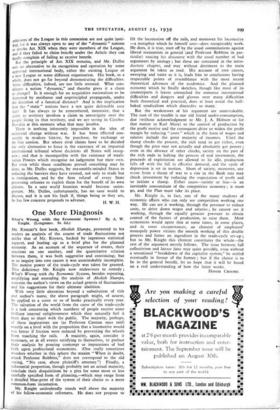One More Diagnosis
MR. KNIGHT'S first book, Abolish Slumps, presented to his readers an analysis of the course of trade fluctuations not unlike that of Mr. Keynes, backed by ingenious statistical support, and leading up to a brief plea for the planned economy. As an account of the sequence of events, their reactions on one another, and the quantitative relation between them, it was both suggestive and convincing; but as an inquiry into root causes it was unmistakably incomplete. The motive power of the trade-cycle was taken for granted. This deficiency Mr. Knight now endeavours to remedy ; What's Wrong with the Economic System, besides repeating, amplifying and amending the analysis of Abolish Slumps, contains the author's views on the actual genesis of fluctuations and his suggestions for their ultimate abolition.
With very little alteration beyond a substitution of title and author's name, the above paragraph might, of course, be applied to a score or so of books practically every year. The salvation of the world from the curse of the trade-cycle is a task concerning which numbers of people receive some brilliant internal enlightenment which they naturally feel it their duty to shut; with the public. The majority, perhaps, of these inspirations are (as Professor Cannan once said) exactly on a level with the proposition that a locomotive would run better if friction were reduced by preventing the wheels
from touching the rails. A majority, again, consider it necessary, or at all events satisfying to themselves, to preface their analysis by pouring contempt or imputations of bad faith upon professional economists. (One really sometimes wonders whether in this sphere the maxim " When in doubt, attack Professor Robbins," does not correspond to the old saying, "No case, abuse plaintiff's attorney.") Finally, a substantial proportion, though probably not an actual majority, conclude their disquisitions by a plea for some more or less carefully specified form of planning,—which may range from a detailed blue-print of the system of their choice to a mere common-form incantation.
Mr. Knight undoubtedly stands well above the majority of his fellow-economic reformers. He does not propose to lift the locomotive off the rails, and moreover his locomotive —a metaphor which he himself uses—does recognisably work. He does, it is true, start off by the usual comminations against liberal economists in general (and Professor Robbins in par- ticular) saucing his discourse with the usual number of bad arguments by analogy ; but these are contained in the intro- ductory chapter, and may without detriment to the main argument be taken as read. His account of root causes, sweeping and naive as it is, leads him to conclusions having respectable points of resemblance with the most recent theoretical advances of the academics. And the planned economy which he finally sketches, though like most of its counterparts it leaves untouched the immense international difficulties and dangers and glosses over many difficulties both theoretical and practical, does at least avoid the half- baked syndicalism which discredits so many.
But the weaknesses of his argument are unmistakable. The root of the trouble is our old friend under-consumption, due (without acknowledgment to Mr. J. A. Hobson or for that matter to Karl Marx) to the control of production by the profit motive and the consequent drive to widen the profit margin by reducing " costs " which in the form of wages and salaries include the great majority of incomes. Until the slump checks the process, the rich tend to get richer, even though the poor may not actually and absolutely get poorer ; even in the absence of other checks, satiety on the part of the rich ends in halting the process of real investment, the proceeds of exploitation are allowed to lie idle, production falls off with the fall in effective demand, and the cycle of depression is set in motion. Short of satiety, moreover, any event from a threat of war to a rise in the Bank rate may check investment by reducing the expectation of profit and so initiate a slump. Either cause—satiety or fear—is an inevitable concomitant of the competitive economy ; it must go, and the Plan must take its place.
Mr. Knight is, in fact, one of the many students of economic affairs who can only see competition working one way. He can sec it working, through the pressure to reduce costs, to drive down wages and salaries ; he cannot see it working, through the equally genuine pressure to obtain control of the factors of production, to raise them. Most economists would agree that at some times, in some places, and in some circumstances, an element of employers' monopoly power vitiates the smooth working of this double process and forms an ingredient in the trade-cycle set-up ; but to Mr. Knight this element constitutes the whole—the rest of the argument merely follows. The issue between full collectivism and laisser faire may quite possibly, even without a sensational " breakdown of the capitalist system," be settled eventually in favour of the former ; but if the choice is to be to the general benefit, let us hope that it will be based on a real understanding of how the latter works.
HONOR CROOME.








































 Previous page
Previous page